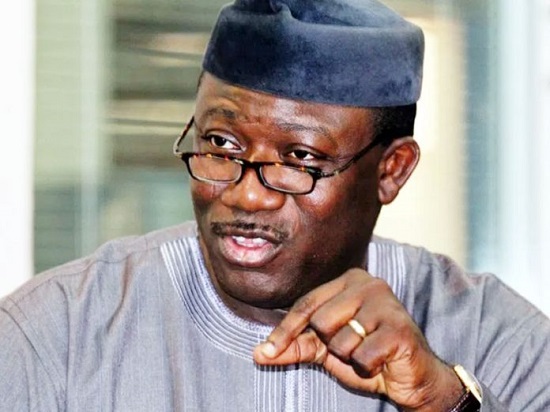*Seeks end to ethnicising, religionising crime
Ekiti State Governor, Dr. Kayode Fayemi at the weekend urged Nigerians to look beyond religious divides and sentiments to elect the next president in 2023.
Fayemi, also Chairman, Nigeria Governors’ Forum (NGF), warned against giving ethnic colouration to crimes just as he urged Nigerians irrespective of their religious and ethnic backgrounds to join hands to defeat evil merchants.
He gave this advice while delivering the convocation lecture at the graduation of Good Shepherd Major Catholic Seminary, Kafanchan, Kaduna State on Friday.
The lecture was titled “The Church, Politics and Future Elections.”
At the attendance were seminarians, the graduates, political figures and religious leaders including the Catholic Bishop of Sokoto Diocese, Rev Mathew Hassan Kukah among others.
Speaking at the lecture, Fayemi said the church “has important roles to play as the nation inches towards another cycle of elections in 2023 in mobilising the laity, women and youth organisations for effective political participation that will lead to the choice of quality and God fearing leaders.”
He said while it would be nice to have a Christian emerge as the next President, Christians should not be beclouded by religious sentiments in exercising their franchise in the 2023 polls but should organise platforms to interrogate candidates seeking their votes to ascertain their suitability.
He added: “While it is nice to see one of us being the president in 2023, it is important to look beyond the religious profession of the gladiators or even their ethnic or geopolitical origin.
“The church should develop a charter of concerns, which must be as inclusive as possible and engage the candidates in direct conversations and debates.
“I will want to see the church and its affiliates and perhaps, in association with other faiths, organize debates for candidates that address fundamental issues around freedom of religion, conscience, association and other areas of interest. The work of the CBCN in this respect is worthy of commendation, but we must do more.”
He noted that leaders driven by the desire “to serve at various levels of governance can turn the tide of decay and create conditions for more of our people to live a better life.”
Fayemi reiterated his call on well meaning Christians not to shy away from participating in partisan politics, which he described as a vehicle for nation building and a platform for the realization of the good of the society.
He charged the church to take part in the electoral processes as an observer and social orientation agent urging it to use its enormous platform to preach peace, tolerance, and consensus among the political class.
Fayemi explained that a united humanity was needed to defeat banditry and other forms of criminality that posed serious security challenges to the polity.
Lending his voice to divergent views on criminal acts being perpetrated in some parts of the country, Fayemi warned against clothing such acts in ethnic or religious garb.
He insisted that stakeholders should not be blinded by primordial sentiments in reacting to issues like banditry, kidnapping and killings in the country.
He said: “Today, criminality is interpreted as either religious genocide or ethnic cleansing. While the media enjoy the serialization of sensational stories, our collective humanity is being eroded as our sense of empathy as a people is now determined by the faith or ethnic background of a victim of criminality.
“The truth is that when bandits kill in the mostly Christian dominated areas, some of us are very responsive to condemn it and then brand it a genocidal attack aimed at wiping out the Christian population in such a place.
“Conversely, when a mostly Muslim dominated population is the victim of the same crime, mum is sometimes the word. Our experience with banditry and kidnappings has shown that we need a united humanity to defeat these evil merchants.
He said: “I would rather a church that will condemn both, show concern, provide the same succour, offer the same sympathy and make the same demands on government.”



